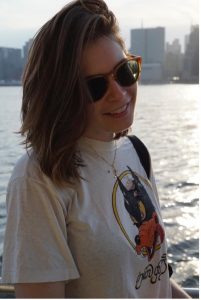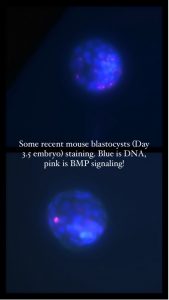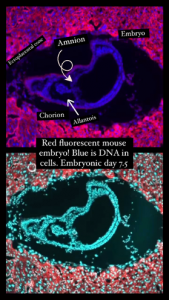Name: Jasmine Temple
Hometown: Forestville, California
Hobbies: Cooking, painting and bio-art, reading
Lab: Mana Parast, placenta development and pathology
Lab website: Mana Parast Lab
What do you study?
I study early placenta development and the stem cells that make up the placenta. After fertilization, the mass of cells turns into embryonic stem cells and placenta stem cells. I study how placenta stem cells later become the whole placenta and how they are different from embryonic stem cells that become the baby.
Why is it important?
Placenta stem cells are only there for a little while in early development. Once they have become a working placenta, there aren’t any cells that can help repair any damage. If there is an injury, it is very hard to rescue the placenta so knowing about how placenta stem cells become placenta stem cells is important for medicine.
What piqued your interest in science?
I first became interested in science when I went to a marine biology camp when I was ten years old. I went to the camp for five years and I loved looking under the microscope at all the microscopic creatures in sea water. It gave me a glimpse of the invisible world of life around us and I was hooked!
What do you like about being a scientist?
I love how studying science gives you an opportunity to learn more about where we came from and how we exist. I think it is really cool how a mass of cells can become a whole human and learning about that intricate process is fascinating to me. Getting to peek into that hidden world gives me so much appreciation for life and getting to work with others who are also interested is so fun!
What are 5 general vocabulary terms someone should know going into your field of science?
Placenta, Fertilization, Stem Cells, Embryo, Development
What are 5 specific vocabulary terms someone should know about your research?
Pluripotency, artificial embryos, trophectoderm/trophoblast, lineage, bone morphogenetic protein (BMP)
Sneak Peak of Jasmine’s SciChat:



